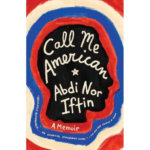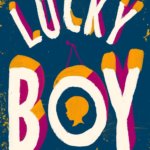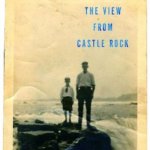For the love of mothers
Though the roads are muddy and the days are more often than not overcast, spring is here and Mother’s Day is around the corner. Mother’s Day: a “celebration honoring the mother of the family, as well as motherhood, maternal bonds, and the influence of mothers in society,” as Wikipedia describes it. (I googled it not because I didn’t know what Mother’s Day is but to get the actual date on which it falls this year, which if you didn’t know is May 12.)
Coincidentally, I just today finished a novel that touches upon pretty much all the aspects of Mother’s Day described above, which is why it seemed a good idea to quote that brief description. And though the title doesn’t suggest a good Mother’s Day read, I can’t think of a better story than Lucky Boy, a novel by Shanthi Sekaran.
Lucky Boy follows two separate narratives: one, of Soli a young woman who travels from Santa Clara, Popocalco, Mexico (a village named after the patron saint of television and eye disease) to California, in search of a better life for herself; the other, of Kavya, an Indian woman living with her husband in Berkeley, who wants nothing more than to have a child. These are two narratives, two journeys, which never would have, never should have, intersected—if not for Ignacio, a little boy and the unwitting force who links, tangles and drives both women’s stories.
There are so many things that are good about this book. It is very well written and extremely compelling and, in describing Soli’s journey and tribulations, opens one’s eyes to both the thrill and the horror of entering this country illegally and trying to survive here without official papers. It’s not a simple read, not only because what happens is often brutal, violent, tragic and painful, but also because one’s sympathies are pulled by both women’s stories. Both are mothers. Both love beyond reason this son, this Ignacio. Throughout the book runs the powerful heartbeat theme of motherhood. What it means to be a mother. A birth mother. A foster mother. And how all-encompassing and primary motherhood is.
“When you have just one possession, you guard it with your life. The you that once centered your universe becomes nothing but a keeper of the one precious thing. As the weeks passed and Ignacio proved increasingly that he would live, Soli’s fear shifted to the newly formed knowledge that she was now tied more fiercely to fate and luck than she’d ever been before. Having a child was like turning inside out and exposing to the world the soft pulp of her heart. If something happened to Ignacio—if illness took him or an accident, she herself would never recover. If the night stole his breath away, as sometimes happened to the very very young, her own breath would never return. At night, thoughts like this sat vigil around her bed. She woke every few hours to look at him, lying next to her in a nest of blankets. She felt for his breath, touched a hand to his forehead, and tried to sleep again.”
I have been telling everyone about this book, and whoever told me about it (I forget who you are), thank you. Excellent.
Another book I have been recommending to anyone and everyone who has expressed any interest in reading is Call Me American, a memoir by Abdi Nor Iftin. Similar to the story of Soli in Lucky Boy, this tells the tale of a Somali man who, from the time he was very young, was obsessed with America. He would dress in American clothes, master American dance moves and managed to pick up some of the English language by listening to Michael Jackson and watching movies about American superheroes. He became known around Mogadishu as “Abdi American.” But in 2006, when the radical Islamist group al-Shabaab came to power, it was suddenly not cool to be an American-loving Somali, and life became very dangerous for the narrator and many others.
It is unthinkable, the kinds of things this Abdi and others have endured (and are, horribly, still enduring in many areas of this world).
“For weeks, we slept on the streets with the dead. Mom would sing the lullaby ‘Huwaaya Huwaa’ in her weak voice, but with our empty bellies the song was not sending us to sleep. With a few hours of napping we continued every morning, only to expect to join the dead. We got used to the corpses, but we could not get used to our painfully empty stomachs. After days of no food or water, I would try to piss and couldn’t, only blood came out. We ate whatever we could chew—unripe neem tree fruit that tasted like bitter olives, lizards we could catch. Nothing was too disgusting, even dead skin we peeled off our feet….”
The passion, determination and resilience of the narrator is breathtaking, and though there is much here about hunger, violence and devastation on so many levels, this memoir is incredibly optimistic. The narrator ends up using his ability to speak English to risk his life to work as an undercover journalist for NPR, and he eventually makes his way (not easy) to his long-beloved America, where he now lives in Maine, working as a translator, hurrah! As messed up as our country is right now, it is amazing to realize and remember that for many it is still a beacon of hope and happiness. (I know, I know, you’ve considered moving to Canada, but really…)
I keep thinking of the line someone thought up to counter MAGA: “Make America Compassionate Again.” Hey, maybe we have never been compassionate (as someone recently pointed out to me), yet relative to many other places on this planet, we have so much to offer—so much freedom and so much opportunity and so much tolerance. I’ll just say, may we aspire to be as great as the Solis and Abdis of the world believe us to be.
And then…because my son recently took a course at his college on Alice Munro, I reread a couple of her books. She is a master. She really is. The View from Castle Rock is a collection of stories that begins on Edinburgh’s Castle Rock, where a young boy looks across the ocean to see America. (OMG, that theme again!) The stories materialized, Munro explains in the foreword, out of research she did on her family, who lived in the Ettick Valley of Scotland, “which the Statistical Account of Scotland (1799) describes as having no advantages.”
The author writes that in this book she is doing something “closer to what a memoir does—exploring a life, my own life, but not in an austere or rigorously factual way. I put myself in the center and wrote about that self, as searchingly as I could. But the figures around this self took on their own life and color and did things they had not done in reality. They joined the Salvation Army, they revealed that they had once lived in Chicago. One of them got himself electrocuted and another fired off a gun in a barn full of horses. In fact, some of these characters have moved so far from their beginnings that I cannot remember who they were to start with.”
I just love stories, love fiction. I do have friends and a real life, really I do, but driving in my car I tend to steep myself in novels (recently two excellent Agatha Christies: Death on the Nile and Murder on the Orient Express), and any other time I am waiting for something or someone, or indoor biking, or falling asleep at night, I am usually reading. Maybe this is very unusual, maybe not. Let me know. But I did raise three upstanding children in between all these books. You should meet them. They are really quite normal. I even read as long as I could stand it when I was in labor with all three of them, I am remembering now, as I ponder books, and the upcoming Hallmark holiday….
As you see, I am trying to bring things back around to the Mother’s Day theme. Which I believe I have now successfully accomplished. Happy Mother’s Day, everyone! Love your mother, love your children, and love this planet, mother to us all.




